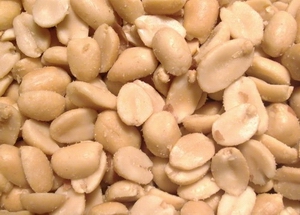 e that is essential to the allergic reaction to peanuts has been identified by researchers at US respiratory hospital, National Jewish Health. Researchers found that blocking the enzyme’s activity in sensitised mice has prevented diarrhea and inflammation and reduced levels of several proteins associated with allergies.
e that is essential to the allergic reaction to peanuts has been identified by researchers at US respiratory hospital, National Jewish Health. Researchers found that blocking the enzyme’s activity in sensitised mice has prevented diarrhea and inflammation and reduced levels of several proteins associated with allergies.The findings, published online in the Journal of Allergy and Clinical Immunology, identified the enzyme, known as Cyp11a1, as a potential target for treatment of the increasingly common and potentially deadly food allergy.
“Right now, we have no therapy for food allergy other than to avoid the allergenic food,” said Erwin Gelfand MD, senior author of the study and Chair of Pediatrics at National Jewish Health. “In Cyp11a1, we have found an essential enzyme and signaling pathway in the intestinal allergic reaction, which are potential targets for intervention,” he said.
Researchers said food allergy had become more common in recent decades, affecting about 8 per cent of the US population. Antihistamines and epinephrine are used in response to allergic reactions in the US, but there is no approved therapy for the prevention of allergic reactions to food. Food allergies can provoke severe, even life threatening, allergic reactions.
Peanut allergy rates in Australia
In Australia, food allergies affect 10 per cent of infants, 4-8 per cent of children aged between 5 and 13 years, and roughly 2 per cent of people over 13.
Among children, peanuts are the most common food allergy (along with cow’s milk and egg), affecting an estimated 3 per cent of Australian children by the age of 12 months, according to Dr Raymond Mullins, Chair of the Australasian Society of Clinical Immunology and Allergy (ASCIA) Anaphylaxis Working Party, and nearly 80 per cent of those with peanut allergy did not grow out of the problem. Dr Mullins said this means that if the rate of peanut allergy was uniform across Australia, there could be approximately 9,000 new cases of peanut allergy each year.
Peanut allergy treatments in Australia
The mainstay of management of peanut and other food allergies in Australia is “avoidance of the food, and awareness of the potential sources of accidental exposure, risk assessment and provision of an emergency action plan if exposure does occur”, Dr Mullins told Australian Food News. In those considered a higher risk of having a potentially dangerous reaction, an adrenaline auto injector can also be provided.
“Immunotherapy to switch off allergy reactions is a well-established treatment for management of hay fever/allergic rhinitis, allergic asthma and dangerous sting insect venom allergy,” Dr Mullins told Australian Food News.
“There are a number of small trials attempting to switch off food allergy in children in the same way, but this is not ready for widespread use outside of research centres because of the high rate of side-effects and lack of long-term tolerance at this time,” Dr Mullins said.
US Study details
The enzyme identified in the American study promotes the first and rate-limiting step in the production of corticosteroids, according to the researchers. These steroids have long been used to treat allergic diseases because they inhibit inflammation associated with the allergic reaction. Evidence in recent years, however, has indicated that corticosteroids may also activate immune cells associated with allergic reactions.
The researchers sensitised mice to peanuts so that they became allergic to the legume. When subsequently fed peanut protein, the mice experienced diarrhea and inflammation in the small intestine. Levels of Cyp11a1 increased, as did cytokine-signaling molecules IL13 and IL17A, which are associated with allergic reactions.
When the researchers used aminoglutethimide (AMG) to inhibit the enzymatic activity of Cyp11a1 in the sensitised mice, it prevented allergic diarrhea and inflammation, and reduced levels of IL13 and IL17A. It also reduced conversion of naïve T cells into allergic Th2 and Th17 subtypes.
“While we evaluated Cyp11a1 blockade in peanut allergy, it could likely have an effect in the full range of food allergies,”Dr Gelfand said.
Australian expert responds to study
Like any allergy, food allergy develops as a result of an immune response to an otherwise harmless substance. Dr Mullins told Australian Food News that a number of allergenic proteins within peanuts had been identified by various researchers as likely triggers of allergic reactions to the legume.
Dr Mullins said that the National Jewish Health hospital study “implies that an allergic reaction in the gastrointestinal tract triggers production of an enzyme that can increase severity of symptoms, implying that blockage of this enzyme might make symptoms less severe”.
“Whether this eventually may result in a therapeutic product is uncertain, but the bottom line is that one also needs to inhibit the initial allergic reaction in the first place,” Dr Mullins said.





